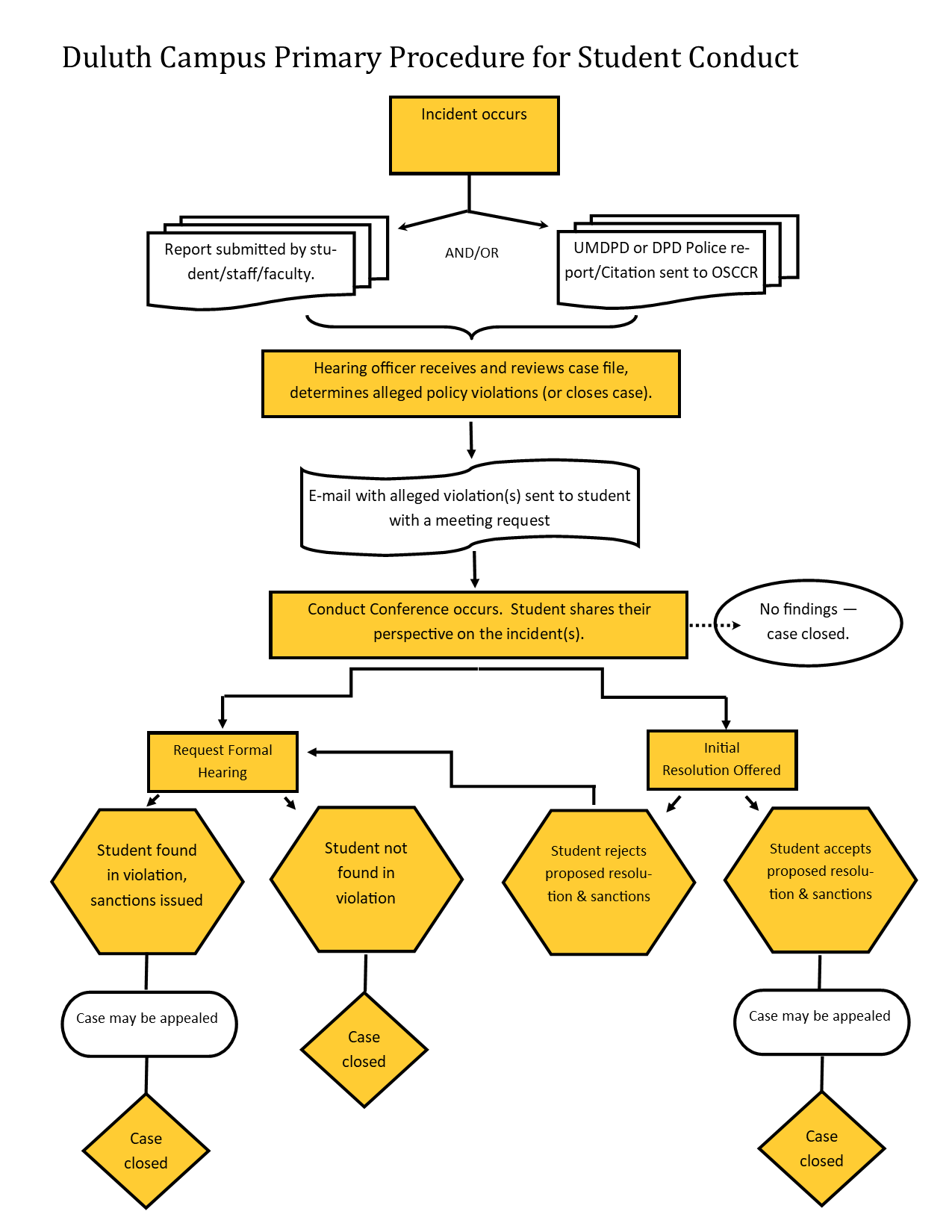Complaints
Ordinarily, the Office of Student Conduct & Conflict Resolution (OSCCR) receives complaints from students, faculty, staff, UMDPD, and DPD. When a report is received, if the information in the report suggests a student engaged in behavior prohibited under the Student Conduct Code, a Conduct Educator is assigned the case. In some cases, more information is needed and OSCCR will conduct an investigation, including interviews with any relevant parties, before determining if the student conduct procedure is an appropriate or relevant means of resolution.
Procedure
The procedure is conducted by officials who do not have a conflict of interest or bias against the parties involved. The Student Conduct process is comprised of the following three levels, as necessary: 1) Conduct Conference/Initial Resolution, 2) Formal Hearing, 3) Appeal. OSCCR encourages Informal Resolution of student conduct cases to resolve after the Conduct Conference with the Initial Resolution, and many cases do not reach the levels of Formal Hearing or Appeal. At every level, the standard of review used for decision-making is Preponderance of the Evidence.
Definitions of Prohibited Behaviors and possible outcomes can be found in the Board of Regents Student Conduct Code, Section IV and V.

- OSCCR contacts the student (Respondent) via UMD email with fair and timely notice of the allegations, and a meeting request for the Conduct Conference.
- During the Conduct Conference, the incident report and the rights and responsibilities of the respondent are reviewed. Questions regarding the conduct process are answered. Failure to attend a Conduct Conference may result in (a) a hold being placed on the Respondent's student account, and/or (b) a decision rendered in the Respondent's absence.
- If the Conduct Educator finds that no prohibited behavior occurred, no further action will be taken and the case will be closed.
- If the Conduct Educator determines the Respondent is responsible for engaging in prohibited behavior an Initial Resolution will be offered. The Respondent may then:
- Accept the Initial Resolution and complete the outcomes as assigned. A student may take up to five calendar days to accept (or reject) the Initial Resolution offered in the Conduct Conference. OR
- Reject the Initial Resolution and invoke their right to a Formal Hearing with the Student Hearing Panel.
- NOTE: At the expiration of five calendar days, any lack of response will be deemed an acceptance of the Initial Resolution.
- If the student invokes their right to a Formal Hearing, The Student Hearing Panel will hear the case and make a determination of responsibility and if appropriate, will assign outcomes. These decisions are separate from the Initial Resolution offered and may be the same or may be different, and outcomes, if applicable, may be more or less stringent based on the panel’s determination.
- The Respondent has the right to appeal either the Initial Resolution or the Formal Hearing decision. Appeals must be filed on at least one of the following grounds:
- New information became available that was not known at the time of the hearing;
- A major procedural error was made, or;
- The outcome assigned was inconsistent with current outcomes for similar prohibited behaviors.
- NOTE: Appeals must be made in writing within 5 week days of the date of the outcome letter using the Appeal Petition.
- NOTE: The Student Appeals Panel will convene to review the appeal. The panel may accept, modify, or reject the decision of the hearing body, or return the matter for further proceedings. The decision of the Student Appeals Panel is final.
- Once any outcomes associated with the final decision for the case are complete, the case is closed.